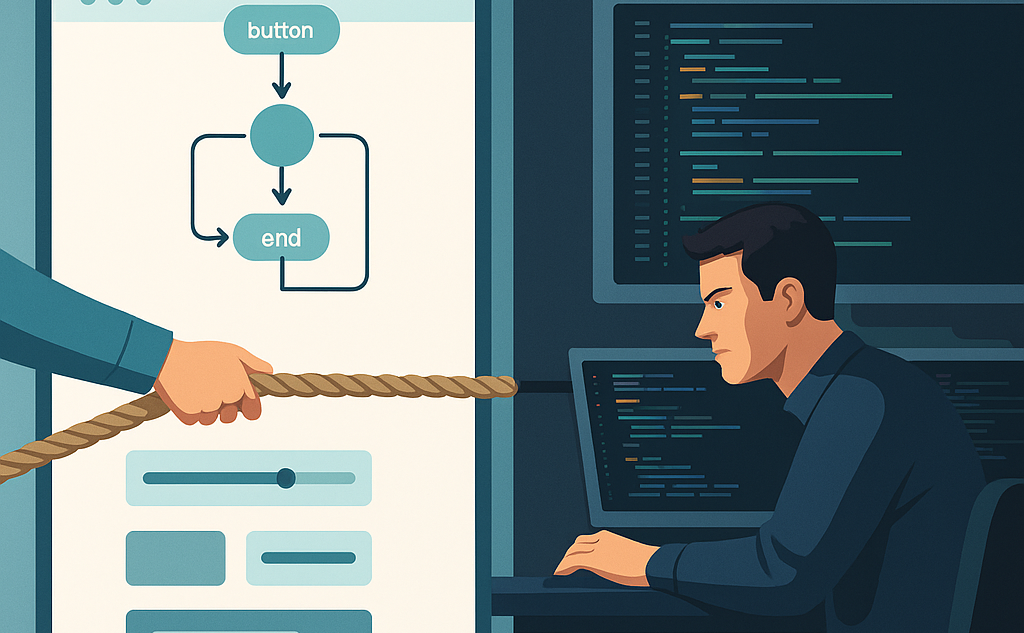What Is Low-Code and Why Is It Everywhere Now?
Low-code platforms are the talk of every software meeting in 2025. Search traffic for “low-code developer jobs” and “are low-code tools replacing programmers” is the highest it’s ever been. Business managers love how quickly they can launch MVPs. Founders brag about “shipping apps without developers.” Even software consultancies now pitch low-code as a solution to speed, scale, and cost.
But ask any senior developer, and you’ll get a different vibe. The rise of low-code tools has caused more anxiety, arguments, and honest self-reflection in the industry than any trend since the move to the cloud.
Are Low-Code Tools Actually Taking Developer Jobs?
Some entry-level software jobs are gone. Companies that used to hire junior devs for routine dashboard projects now push those tasks onto low-code platforms like OutSystems, Mendix, and Power Apps. “Automate basic workflows with zero coding” is the sales pitch, and it works. The result? Fewer positions for beginners, fewer people learning from scratch on live code.
It’s true:
Simple internal tools are now built by business analysts, not devs
CRUD apps and simple forms? Automated, drag-and-drop
“Low-code replacing developers” is a trending phrase for a reason
But there’s another side most articles ignore.
What Low-Code Still Can’t Do (and Probably Never Will)
Start building something with real complexity. The limitations show up fast:
You can’t hack performance at a low level
Integrating with legacy systems gets messy
Security and compliance? Still a developer’s job
Custom APIs and unique user flows? That’s not drag-and-drop work
Stack Overflow and GitHub threads are filled with stories from teams forced to “migrate off low-code” when things got real. Companies hit scaling walls, face debugging headaches, or get stuck when a client wants “one tiny feature” the platform can’t handle.
Are Traditional Software Engineers Safe?
Developers who build systems, not just apps, are safe. Demand for problem-solvers, systems architects, API experts, and security specialists is only going up. Low-code makes some jobs easier, but it’s not eliminating the need for actual engineering. The “death of software development jobs” is a myth.
Hiring data backs it up. Despite the rise in low-code job postings, major companies, from banks to SaaS startups, are increasing hiring for developers who can:
Integrate complex systems
Design for scale
Secure data pipelines
Lead migrations from low-code prototypes to robust, maintainable platforms
How Low-Code Is Actually Changing Dev Careers
There’s a real shift happening, one that doesn’t mean extinction, but evolution. Here’s what we see at Cybersoft and across our partners:
Junior “button-pushing” jobs are disappearing
Devs with experience in integrations, DevOps, and API-first design are more valuable than ever
Teams that blend low-code prototypes with custom modules are shipping faster and spending less time on routine builds
Should You Worry? Or Upskill?
If you’re a developer who’s curious, adaptable, and always learning, you’re not just safe, you’re in a better spot than ever. The new frontier is hybrid: knowing how to use low-code as a tool, and knowing when to build custom.
For anyone starting out, focus on fundamentals. Learn software design, system thinking, and the basics of at least one language. Understand the business value of your code. No platform, no matter how slick, replaces critical thinking.
Where We Stand in the Low-Code Debate
At Cybersoft, we’ve integrated low-code into our internal workflows and MVP development for years. We use it for dashboards, automation, and prototypes. But when clients want scale, security, or something genuinely unique, we build. Every project that starts in low-code eventually needs a real developer to refine, optimize, or even rebuild the core.
This is the pattern we see every quarter. The companies that succeed aren’t the ones replacing developers with low-code. They’re the ones using low-code to speed up iteration, then investing in custom engineering when it counts.
So... Will Low-Code Replace Developers?
The answer is no. But it will change who gets hired, what gets built, and how teams work together. If you’re static, you’ll feel the squeeze. If you’re flexible, you’ll thrive. The only thing that never survives in software is the refusal to adapt.

